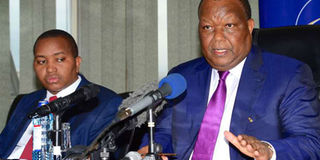Take cue from KAA and let foreigners run our institutions

Transport Permanent Secretary Nyakera Irungu (left) and the Kenya Airports Authority's (KAA's) chairman, General (Rtd) Julius Karangi, at a media briefing at KAA's office at Jomo Kenyatta International Airport in Nairobi on July 12, 2016 in which they announced the appointment of Jonny Andersen as KAA's new managing director. PHOTO | SALATON NJAU | NATION MEDIA GROUP
What you need to know:
- The appointment of Jonny Andersen is a break from the employment apartheid that has seen such State jobs mostly handed to members of the two ethnic communities that form the bedrock support of President Uhuru Kenyatta’s Jubilee alliance.
For all his success managing airports across the world, Mr Andersen would be well advised to temper any expectations in the corner office.
It was odd that a government elected on the back of anti-foreigner sentiment picked a Norwegian to head the Kenya Airports Authority (KAA), a State corporation, mid-July.
Nevertheless, the appointment of Jonny Andersen as the KAA chief executive still represented some freshness – a break from the employment apartheid that has seen such State jobs mostly handed to members of the two ethnic communities that form the bedrock support of President Uhuru Kenyatta’s Jubilee alliance.
For all his success managing airports across the world, Mr Andersen would be well advised to temper any expectations in the corner office. Media reports suggest that the Norwegian was only a compromise candidate after the two major stakeholders in Jubilee failed to agree on whose turn it was at the KAA feeding trough. If true, he had better fasten his belt. Yet Kenya could do with more foreigners at the helm of its public institutions.
The mali ya umma attitude, elite greed, “tenderpreneurship” culture, and ethnic bigotry are increasingly making it difficult for Kenyans of high integrity to get or hold down senior positions in the public service.
The system appears fatally rigged, with the political elite and the “tenderpreneurship” cartels ultimately deciding who runs a public institution, what he or she must or must not do, how long he or she stays on that job, and when he or she must quit.
One only needs to check the current manoeuvres at the Independent Electoral and Boundaries Commission (IEBC), the Ethics and Anti-Corruption Commission (EACC) and the Judicial Service Commission (JSC) to know who is pulling the strings.
POLITICAL GRANDSTANDING
After a period of political grandstanding during which some of them seemed to believe they were untouchable, an unfolding elite consensus through the joint Senate and National Assembly Committee will see the IEBC bosses sent packing soon after all.
Remove the procurement fiasco and the IEBC inquisition has echoes in the ongoing recruitment of the chief justice and Supreme Court judges by the JSC.
The electoral value of the Supreme Court shot up, probably higher than the IEBC’s, with its decision of the 2013 presidential election, making its seven judges persons of interest for the elite. Suspicions that the recruitment was rigged right from the shortlisting of candidates have seen court cases filed to try to stop the process.
At the EACC, Philip Kinisu looks set for the ignominy of being hounded out of office having served the shortest time as chairman.
Forget Mr Kinisu’s early protestations of innocence and defiance amid calls that he resign. Recent experience shows that once the elite or the “tenderpreneurship” cartels set an anti-corruption czar up for a fall, the question is how hard or soft.
With so many local vested interests choking these key public institutions, isn’t it time we swallowed our pride and let foreigners run them for us?
[email protected]; @otienootieno




